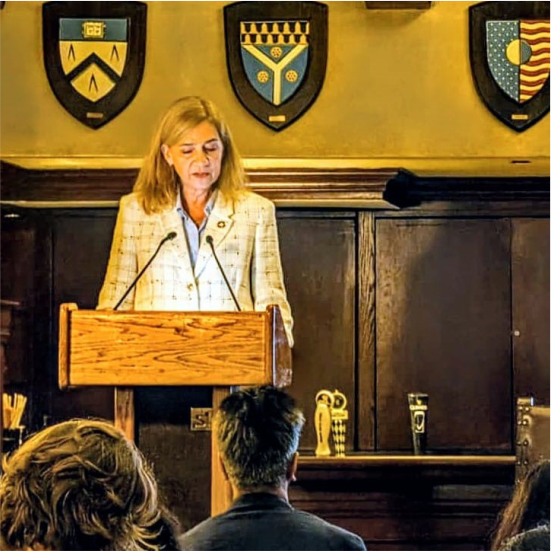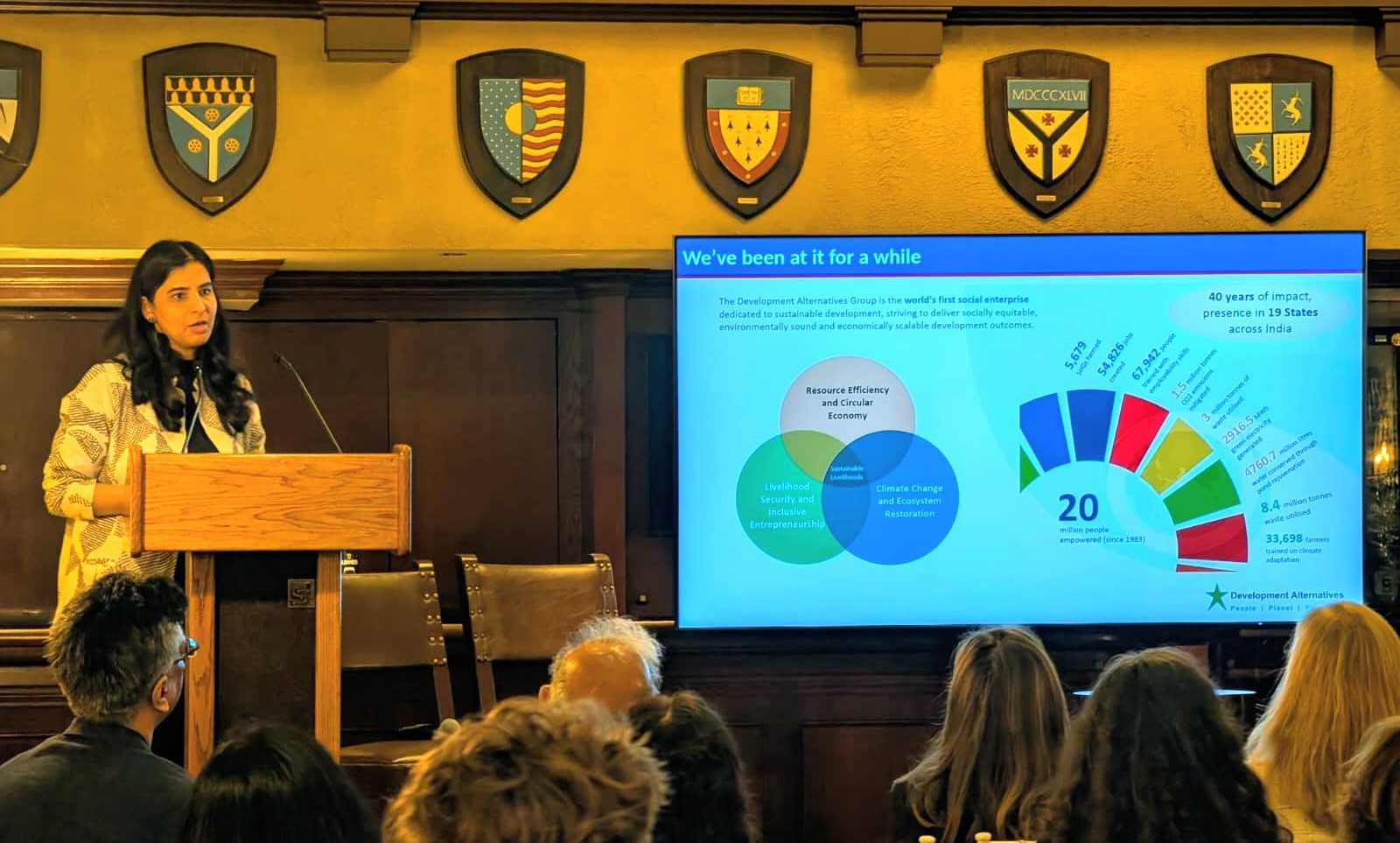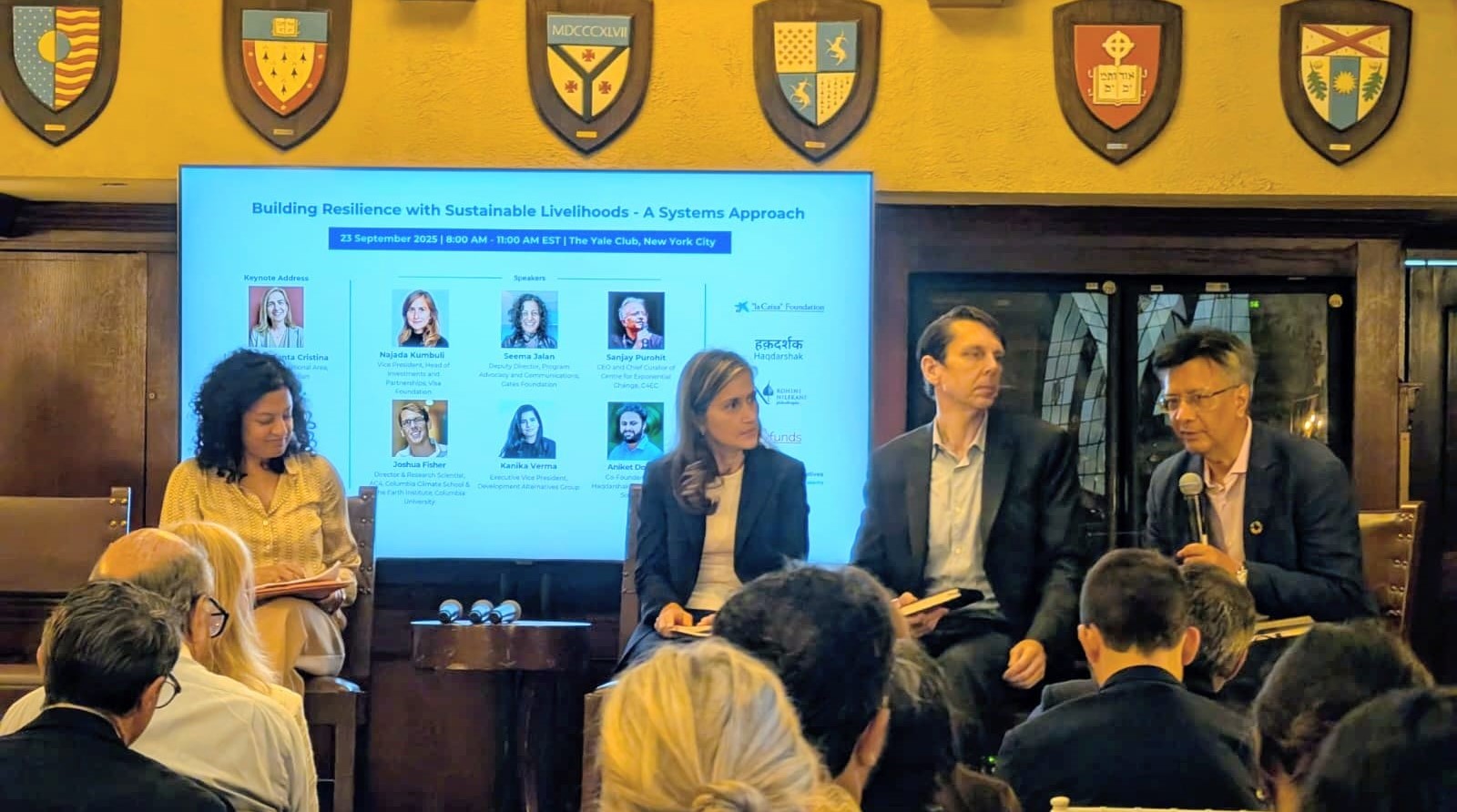
On the sidelines of UNGA and Climate Week in New York, Development Alternatives and partners held a dialogue on Building Resilience with Sustainable Livelihoods, highlighting systemic solutions and inclusive entrepreneurship for climate resilience.
#ClimateWeekNYC
H.R.H. Infanta Cristina delivering the keynote on philanthropy’s role in catalysing innovation and impact.
On September 23, 2025, amidst the global dialogues at the United Nations General Assembly and Climate Week in New York, a pivotal gathering convened to address a pressing question: how can society, government, and markets collaborate to build resilient communities and create livelihoods at scale? Hosted by Development Alternatives in partnership with the “la Caixa” Foundation, Haqdarshak, Rohini Nilekani Philanthropies, and Givfunds, the event brought together leaders from philanthropy, finance, and development to explore transformative pathways for inclusive and sustainable development.
The dialogue commenced with a keynote by H.R.H. the Infanta Cristina, Director of the International Area at the “la Caixa” Foundation. She underscored the critical role of philanthropy in catalysing innovation and scaling impact for vulnerable communities globally. Her address set the tone for the discussions that followed, emphasising the need for systemic approaches to address complex social and environmental challenges.
Subsequent sessions featured insights from various thought leaders. Najada Kumbuli, Vice President of the Visa Foundation, highlighted how catalytic capital and blended finance can unlock entrepreneurial ecosystems, particularly in underserved regions. Seema Jalan, Deputy Director of the Gates Foundation, emphasised the importance of linking livelihoods with gender and social equity to ensure inclusive impact. Sanjay Purohit, CEO of the Centre for Exponential Change, advocated for systems thinking, positioning communities as co-creators of solutions for scalable impact. Joshua Fisher, Director of the Columbia Climate School, stressed that deep listening and dialogue on livelihood security are prerequisites for building climate resilience.
Reflecting on these discussions, Shrashtant Patara, CEO of Development Alternatives, noted that “lives and livelihoods of people have acquired much more prominence in the discourse on climate, calling for initiatives aimed at building resilience to be systemic in approach, with green and inclusive entrepreneurship being the key to impact at scale.”
The gathering also spotlighted the Work4Progress (W4P) programme, a long-standing collaboration between Development Alternatives and the “la Caixa” Foundation. This initiative demonstrates how systemic, network-driven approaches can empower women and youth to co-create enterprises and generate jobs in underserved regions. By integrating social innovation with sustainable development, W4P exemplifies the potential of inclusive entrepreneurship to drive meaningful change.
Looking ahead, Kanika Verma, Executive Vice President of Development Alternatives Group, unveiled the mission of creating one million livelihoods by 2030.
A central theme that emerged was the need to reimagine finance to unlock the potential of underserved communities. Traditional financial systems often fail to serve the “missing middle”. This gap stifles the aspirations of women and youth in rural areas, limiting their access to capital and opportunities for growth.
In response to this challenge, Development Alternatives has been pioneering innovative financial models that prioritise trust, flexibility, and inclusion. These initiatives aim to move finance closer to those who deserve it most, empowering individuals to transform their aspirations into tangible outcomes.
Building on this vision, Development Alternatives, Givfunds, Impact Lens, and partners announced the Innovative Finance Facility—a landmark initiative designed to mobilise catalytic capital through blended finance, impact investing, and partnerships. This facility aims to channel resources into scalable, community-driven solutions that not only generate livelihoods but ensure they are inclusive, resilient, and regenerative.
The event underscored a critical insight: to build resilient communities, we must move beyond traditional paradigms and embrace innovative approaches that place people at the center of development. The gathering served as a clarion call for a paradigm shift in how we approach development. It highlighted the need for systemic change, inclusive finance, and collaborative action to build resilient communities that can withstand the challenges of the 21st century.

Kanika Verma outlining Development Alternatives’ mission to create one million livelihoods by 2030

Shrashtant Patara moderating the panel discussion on Innovative Solutions and Systems Thinking for Sustainable Livelihoods